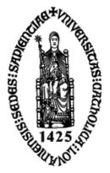比利時天主教勒芬大學
出自 MBA智库百科(https://wiki.mbalib.com/)
比利時天主教勒芬大學(Catholic University of Leuven,Katholieke Universiteit Leuven)比利時天主教勒芬大學網站網址:http://www.kuleuven.be
目錄 |
For the pre-1968 university, see Catholic University of Leuven. For the present-day French-speaking university, see Université catholique de Louvain.
The Katholieke Universiteit Leuven (in short K.U.Leuven) is the Flemish offshoot of the oldest university in the Low Countries which was originally founded in 1425 (see Catholic University of Leuven). Centrally located in the historic town of Leuven in Flanders, the K.U.Leuven is officially a Dutch-speaking institution. With more than 31,000 students in 2006, the K.U.Leuven is also the largest university of the Low Countries. Worldwide, however, especially in the English speaking world, the university is often known by its anglicized French name 'Louvain'. The university of Leuven was for centuries a major contributor to the development of Catholic theology. With predecessor institutions dating back to 1425, the K.U.Leuven and its French-speaking counterpart, the Université catholique de Louvain, are regarded as the oldest existing Catholic universities in the world.
Situated in the heart of Western Europe, K.U.Leuven has been a centre of learning for almost six centuries. Founded in 1425 by Pope Martin V, K.U.Leuven bears the double honour of being the oldest existant Catholic university in the world and the oldest university in the Low Countries.
In its early days, our university was modelled on the universities of Paris, Cologne, and Vienna. In a short time, it grew into one of the largest and most renowned universities in Europe. Its academic fame attracted numerous scholars who made valuable contributions to European culture. In the sixteenth century the humanist Desiderius Erasmus lectured here, where he founded the Collegium Trilingue in 1517 for the study of Hebrew, Latin, and Greek - the first of its kind. The tutor of the young emperor Charles V, Adriaan Cardinal Florensz of Utrecht, was a professor here before being elected in 1522 as the last non-Italian Pope before Pope John Paul II. The philologist, legal scholar, and historian Justus Lipsius taught here for many years.
The mathematician Gemma Frisius helped to lay the foundations of modern science and tutored many famous scientists, including the cartographer Gerard Mercator, whose map projection is still in use, the botanist Rembert Dodoens, and the father of modern anatomy, Andreas Vesalius. In a later period, the theses of the Leuven theologian Cornelius Jansenius provoked a large and heated controversy both inside and outside the Church. In the seventeenth and eighteenth centuries, K.U.Leuven was an important training centre for Roman Catholic intellectuals from Protestant countries. At the end of the Age of Enlightenment, in 1783, the chemist Pieter Jan Minckelers discovered the suitability of coal gas for lighting. In the nineteenth century, at the instigation of Pope Leo XIII, K.U.Leuven became an important centre of Thomist philosophy.
ErasmusNot all has been trouble-free, though, in the university's illustrious history. It has had its share of difficulties during the various social and political upheavals in this region from the sixteenth to the nineteenth centuries. More recently, the two World Wars of the twentieth century deeply scarred the university. In 1914, the University Hall with its precious library was set in flames by German troops and 300,000 books were reduced to ashes. Afterwards, an international solidarity campaign with a major American contribution helped construct a new library on the present Ladeuzeplein. Unfortunately, this library was burned down in 1940 during the Second World War and this time only 15,000 of its 900,000 volumes were saved. Since then, the university library, and in fact the entire university, has undergone a thorough reconstruction.
The university is located in Flanders, the Dutch-speaking northern part of Belgium. With the Dutch language's steady rise to renewed prominence, 1968 saw the university split into two new universities. The French-speaking Université Catholique de Louvain moved to the newly built campus in Louvain-la-Neuve. The Dutch-speaking Katholieke Universiteit Leuven remained in the historic town of Leuven.
For the history of the university library prior to 1970, see Catholic University of Leuven#Library.
When the university was split, those books that could not be divided otherwise (e.g. according to the wishes of the benefactors who donated them) were divided as follows: those with an odd-numbered shelfmark stayed in Leuven, while the even-numbered ones moved to Louvain-la-Neuve. This gave rise to the widespread myth that every other volume was separated - splitting up runs of journals and volumes of encyclopedias - but since such series each had a single shelfmark this was never in fact the case. The library now owns about one million works.
The K.U. Leuven's Faculty of Theology library is among the most comprehensive in the world.






